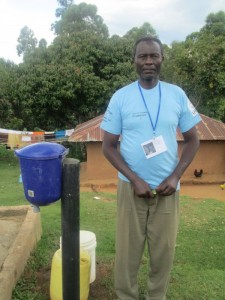
Small water project in Kenya
Elijah’s mud house includes a dirt floor and an iron roof in Mpaka in Kenya. He lives there with his family, which includes 2 children. The community of Mpaka village collects their drinking water from a hole bored in the ground because there is no piped water supply. Imagine living in Canada and having no running water. His water is easily contaminated with bacteria that can cause diarrhea and other water-born diseases, which can also cause death and usually makes a person so sick they can’t function.
A new chlorine dispenser offers a solution to this. The dispenser would cost about $600, and is installed at the local water source where users turn a valve to add chlorine to their jerricans, then collect water as usual. The chlorine disinfects the water, and provides residual protection from recontamination. This project would benefit 11 households. Elijah has volunteered to be the dispenser promoter, who is responsible for refilling the chlorine and encouraging the rest of the community to treat their water and keep themselves and their families healthy.
Kenya is a country in Africa that has made massive progress over the last 50 years, and has become very well developed because small projects like this boost people’s lives and help them move up in a sustainable way. I’ve worked on several larger water based projects, and if I can get photos / videos I’ll be posting them in months to come.
Asif Zamir